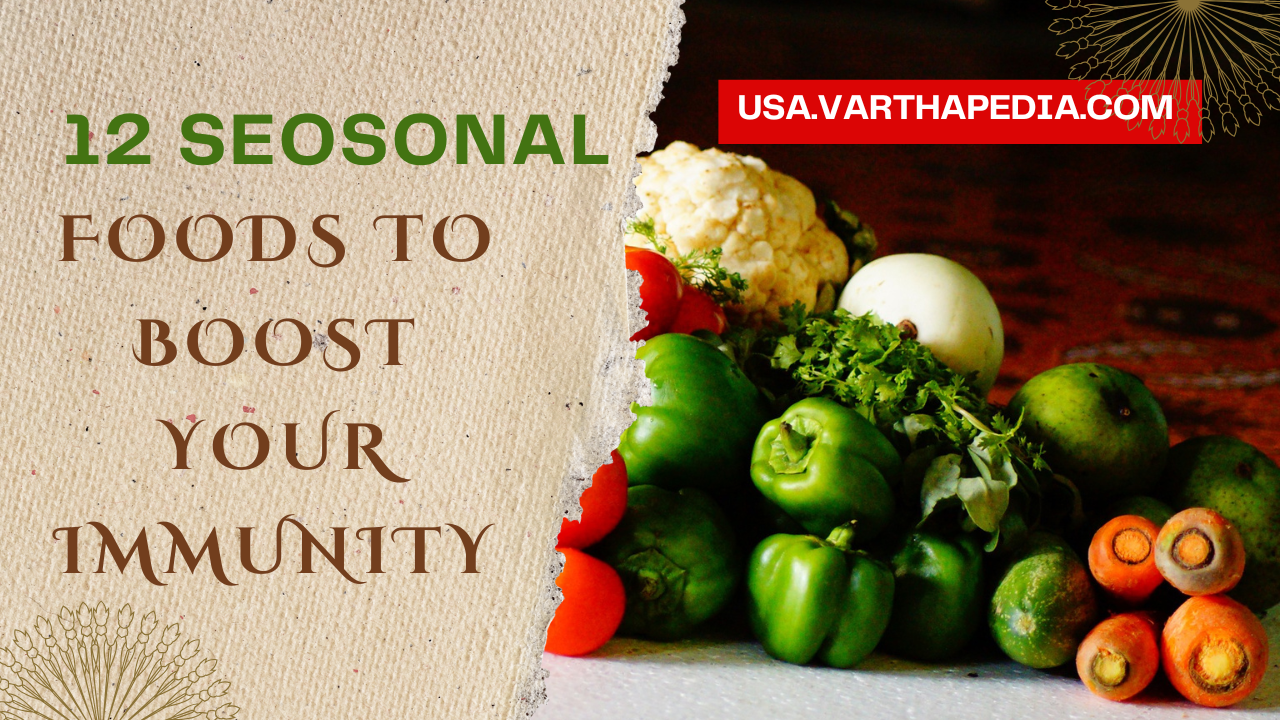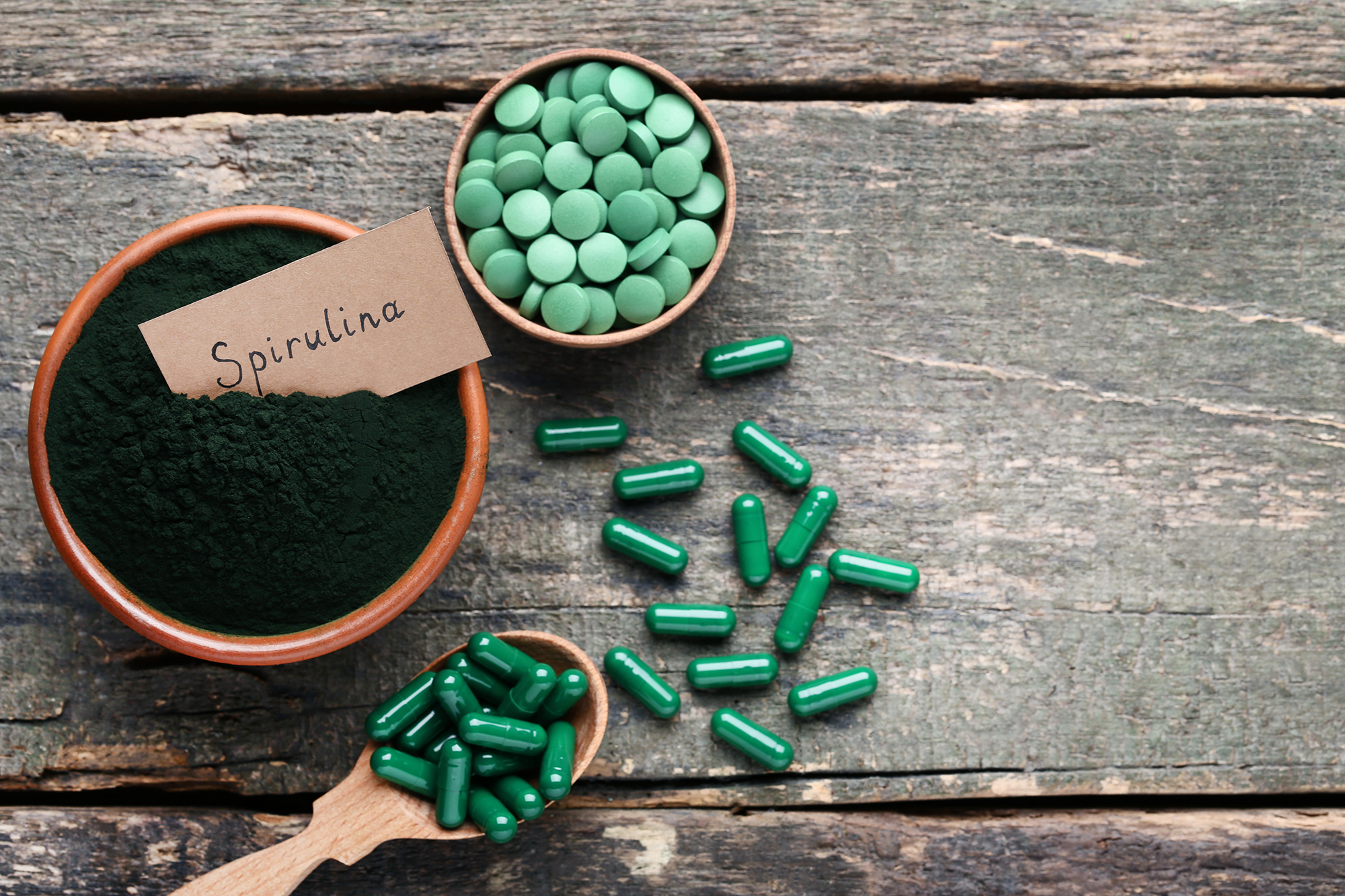
Introduction
Spirulina is a blue-green microalgae that’s been called one of the most nutrient-dense foods on the planet. Once a staple for ancient civilizations, spirulina is now embraced by wellness enthusiasts, NASA researchers, and nutrition experts alike for its impressive nutritional profile and wide-ranging health benefits. This blog will break down everything you need to know about spirulina, its uses, and address the most common questions so you can decide if it deserves a spot in your diet.
What Is Spirulina?
Spirulina is a type of cyanobacteria, commonly referred to as blue-green algae. It grows naturally in both fresh and saltwater environments but is now typically cultivated in controlled conditions to ensure purity. Rich in protein (about 60–70%), spirulina is also packed with vitamins, minerals, essential amino acids, and powerful antioxidants, making it a true superfood.
Health Benefits of Spirulina
- High in Nutrients: Provides ample protein, vitamins (B, E, K), minerals (iron, magnesium), and essential fatty acids.
- Potent Antioxidant & Anti-inflammatory: Contains phycocyanin, a compound with strong antioxidant and anti-inflammatory activity that helps reduce oxidative stress and inflammation.
- Supports Heart Health: Helps lower cholesterol and triglyceride levels, while increasing “good” HDL cholesterol.
- Immune System Boost: Promotes the production of white blood cells and antibodies, strengthening the body’s defense against viruses and bacteria.
- Allergy and Oral Health Relief: Shown to alleviate allergy symptoms and improve oral health by reducing dental plaque and gum inflammation.
- May Support Weight Management: The high protein content helps control appetite by promoting satiety, potentially aiding in weight loss efforts.
- Potential Cancer Protection: Some research suggests it may inhibit tumor growth, though more study is needed.
Expert Insights: What Does Spirulina Do for Your Body?
Spirulina offers comprehensive health support:
- Delivers essential vitamins, minerals, and protein to sustain energy.
- Antioxidants protect cells from damage, reducing the risk of chronic disease.
- Promotes a healthy heart by lowering harmful cholesterol and improving blood pressure.
- Encourages gut health by supporting beneficial intestinal bacteria.
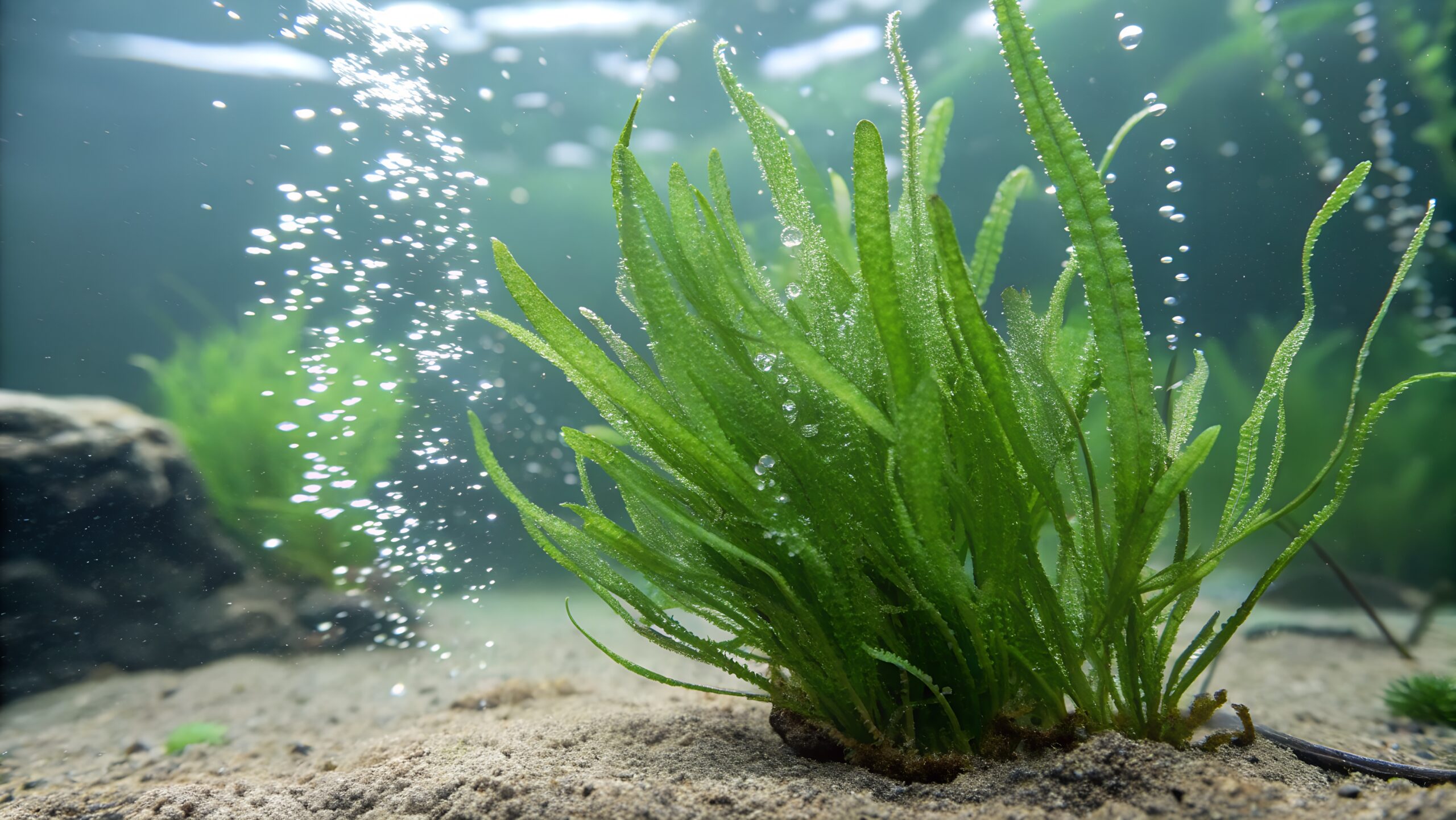
NASA’s Take on Spirulina
NASA has incorporated spirulina into astronaut diets due to its dense nutrition and ease of cultivation in space. The primary strains chosen, Spirulina platensis and Spirulina maxima, provide astronauts with vital proteins and nutrients during long missions. Spirulina’s minimal resource requirements, compact grow systems, and rapid harvest cycles make it an ideal candidate for supporting astronaut health in space travel and future colonization efforts.
What Does Spirulina Taste Like?
Spirulina has an earthy, grassy, and slightly mineral flavor, often compared to seaweed or an oceanic, “green” taste. Some people note a mild bitterness and a hint of sulfur or fishiness, especially if the product is not fresh. Many find it palatable when blended into smoothies or taken in capsule form to mask the flavor.
Is Spirulina Good for Skin?
Spirulina’s antioxidant and anti-inflammatory properties show promise for skin health:
- Supports healthy aging and collagen production, helping tighten skin and improve elasticity.
- May protect skin from oxidative stress that accelerates aging.
- Some small studies suggest spirulina could aid in detoxification and help manage certain skin infections, although further human trials are needed.
What Is the Price of 1kg Spirulina Powder?
The price for 1kg of spirulina powder in India typically ranges from ₹500 to ₹800 (roughly $7–$10 USD), depending on the brand and quality. Premium or organic varieties may see higher prices. Always check for reputable suppliers to ensure product purity and safety.
Is Spirulina Good for Hair?
Yes, spirulina offers several benefits for hair:
- High protein and amino acid content supports keratin formation, essential for strong, healthy hair.
- Rich in iron, zinc, and B vitamins, all of which promote hair growth and reduce hair loss.
- Antioxidants protect follicles from damage and oxidative stress; some even report improvements in scalp health and reduction in dandruff.
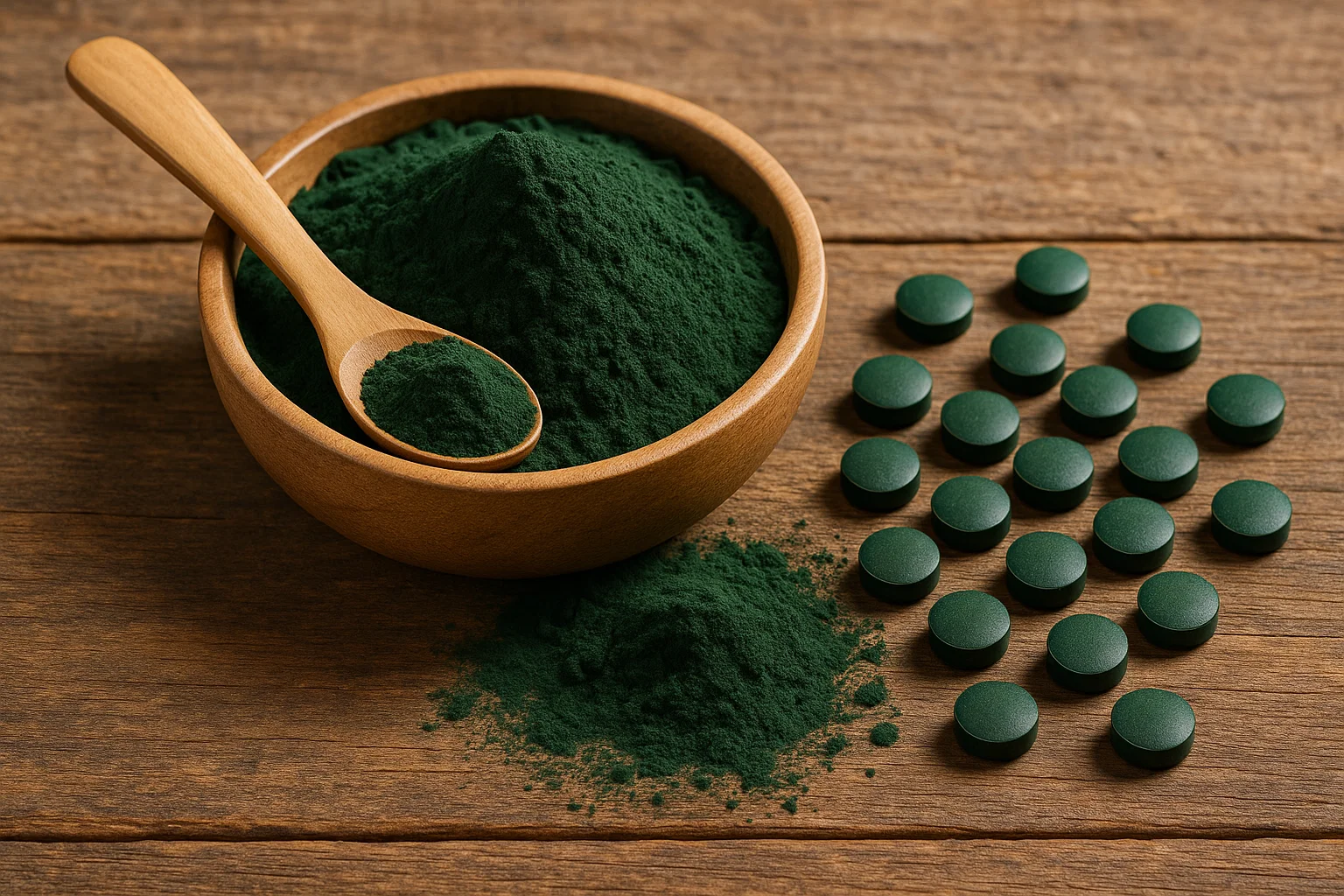
Spirulina for Hair Loss Problem:
Hair loss is a major problem affecting many people today. Out of every 10 people who come to the doctor, about 8 mention this problem, indicating the severity of the issue. Many people are frustrated due to lack of proper solutions for this problem. However, there is a natural remedy available.
About Spirulina: Among the wonderful medicines that nature has provided, Spirulina is one of them. Both modern science and Ayurvedic knowledge recommend Spirulina as an excellent medicine for hair growth.
Key Points:
-
Protein Content: Spirulina contains about 57% protein, which is higher than soybeans (44-48%). Hair is primarily made of protein (keratin), so adequate protein intake promotes faster hair growth.
-
Essential Amino Acids: Spirulina contains all essential amino acids needed for hair health, including cysteine, methionine, arginine, lysine, proline, and tyrosine.
-
Vitamins: Contains important vitamins for hair health including:
- Vitamin B12
- Vitamin B1
- Vitamin B2
- Zinc
-
Antioxidants: Contains powerful antioxidants like:
- Zeaxanthin
- Lutein
- Cryptoxanthin
-
Stem Cell Enhancement: Research shows that Spirulina increases the number of stem cells and papilla cells, which are crucial for hair growth.
Usage Instructions:
- Take 5-10 grams of Spirulina powder daily
- Can be mixed with yogurt or taken in capsule form
- Take morning and evening doses
- Results visible in 10-20 days with regular use
Ayurvedic Perspective: According to Ayurveda, hair health depends on overall body balance. Hair is related to the Asthi dhatu (bone tissue). Spirulina strengthens this dhatu and provides complete nutrition to hair.
Benefits:
- Reduces hair fall
- Promotes hair growth
- Strengthens hair follicles
- Improves overall hair health
- Detoxifies the body
- Enhances overall health
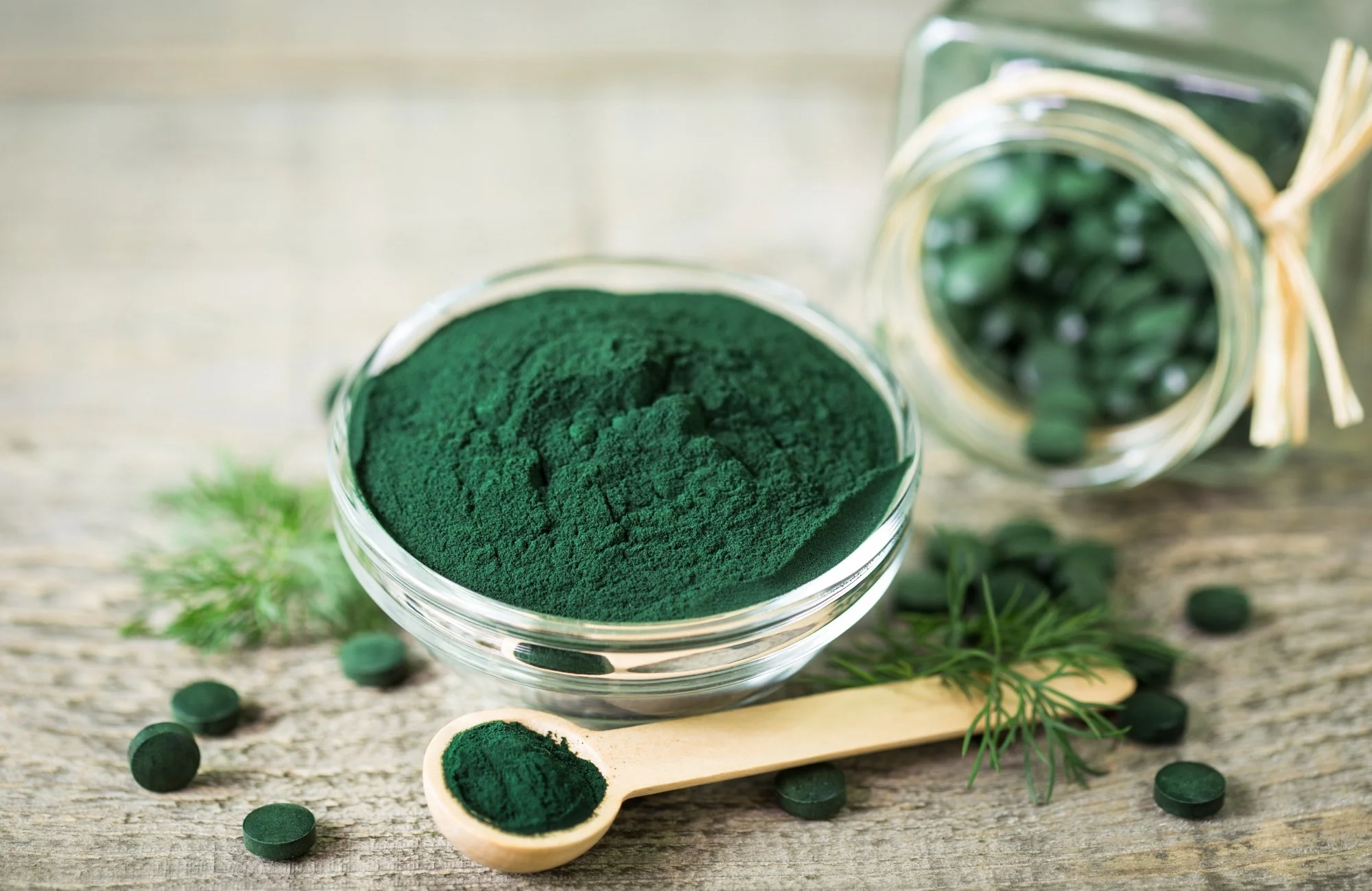
Is Spirulina Safe to Take Daily?
Spirulina is generally recognized as safe (GRAS) by the US FDA and is considered non-toxic at recommended doses. Most people can take 1–10 grams daily. However, those with autoimmune disorders, phenylketonuria (PKU), allergies to algae, or who are pregnant or nursing should consult a healthcare provider first, as contaminated supplements may carry health risks due to heavy metals or toxins.
Can I Grow Spirulina at Home?
Yes, you can grow spirulina at home with the right equipment and care:
-
- Requires a growth medium of filtered, alkaline water (pH 8–10), nutrient additives, and adequate sunlight or artificial grow lights.
-
- Maintaining water quality and correct nutrient balance are key for a healthy, high-yield culture.
-
- Home kits and guides are available for beginners interested in sustainable, personal spirulina cultivation.
What Foods Contain Spirulina?
Spirulina is not naturally found in conventional foods, but rather as:
-
- Powder or tablets (supplements).
-
- Additive to smoothies, juices, protein bars, or energy bites.
-
- An ingredient in certain snack bars, chocolates, and plant-based products designed for extra nutrition.
Frequently Asked Questions (FAQs)
| Question | Expert Answer |
|---|---|
| What does spirulina do for your body? | It supports energy, immunity, heart health, and provides antioxidants and protein. |
| What does NASA say about spirulina? | NASA uses spirulina for astronauts because it’s nutritious, easy to grow, and supports health on long missions. |
| What does spirulina taste like? | Earthy, grassy, with mineral and mild oceanic or seaweed-like notes. Bitterness and fishiness increase with poor quality. |
| Is spirulina good for skin? | Yes, its antioxidants may improve elasticity, skin tone, and help protect from oxidative stress. |
| What is the price of 1kg spirulina powder? | Typically ₹500–₹800 INR (about $7–$10 USD), depending on purity and source. |
| Is spirulina good for hair? | Rich in protein, vitamins, iron, and antioxidants—supports strong, healthy hair and healthy scalp. |
| Is spirulina safe to take daily? | Generally safe in moderate amounts, but consult with a healthcare provider if you have specific health conditions. |
| Can I grow spirulina at home? | Yes, with the right growth medium, nutrients, and care. Home kits are available. |
| What foods contain spirulina? | Typically consumed in supplement form or added to smoothies, snacks, and nutrition bars. |
Conclusion
Spirulina stands out as a superfood with real potential to enhance your diet, thanks to its impressive nutritional profile, wide-ranging health benefits, and endorsement by leading experts and organizations. Whether you blend it into a smoothie, take it as a supplement, or even grow it at home, spirulina can be a powerful addition to a balanced, health-focused lifestyle—as long as you prioritize purity, safety, and consult with medical professionals when needed.
